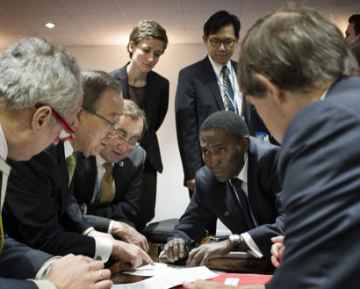“The climate change agreement is a public health agreement,” declared Isabel Aranda, Programme Officer at the UNFCCC Secretariat, in the run-up the landmark conference of the parties (COP21) meeting in Paris. Climate and public health experts alike joined to underscore the links between climate health and human health in what culminated in the world’s first universal climate accord on 12 December 2015.
While carbon emissions must be mitigated to avert catastrophic climate change in the medium to long term, adaptation is urgent for the present and short-term as health sectors begin to deal with the impacts of carbon released in previous decades. The World Health Organization (WHO), the specialized UN body, has taken a leading role in sounding the alarm over these risks. At the COP21, the WHO hosted an event “Why the Climate Change Agreement is Critical to Public Health” with the presence of health ministers, academics and civil society. At the event, the WHO Director-General Margaret Chan framed climate change as a defining issue for public health in the 21st century.
Among the most acute dangers of climate change to public health is the scale and increasing frequency of extreme weather events such as heat waves. The associated risks of heat waves are on a par with day-to-day air pollution. According to WHO estimates, air pollution leads to 7 million deaths from cardio-respiratory illnesses a year worldwide. As BASE researcher Aline Chiabai notes in her interview in this issue, “Air pollution is exacerbated during heat waves, although how pollutants interact with heat are poorly understood”. As the global agricultural sector continues to deal with unprecedented weather patterns, low- and middle-income populations can furthermore expect increasing food insecurity. This can lead to numerous indirect consequences such as migration and even conflict with health impacts such as malnutrition, injury or loss of life. New settlement patterns and changing weather conditions suggest a rise in the incidence of infectious food-, water-, and vector-borne diseases.
Public health authorities agree that the Paris Agreement’s most significant contribution to human health will be the commitment to keeping global warming to well below 2°C. The agreement also specifically recognizes the principles of a “right to health” and protection of the most vulnerable. Dr Maria Neira, WHO Director, Department of Public Health noted that “The Paris Agreement… pushes countries to develop adaptation plans that will protect human health from the worst impacts of climate change.” The COP will introduce “cycles of action” on adaptation, where, much like with mitigation cycles, countries will review and take stock of their adaptation needs and progress every five years. Going forward in the period 2015-2020, the COP will particularly examine climate policies that have “adaptation, health and sustainable development co-benefits.” A commitment to greater access to climate finance for poorer nations and greater public investment in adaptation overall is likely to facilitate such policies.
The new commitments made at the COP21 are expected to produce co-benefits for health through synergies between climate mitigation and public health. In developed countries, this means enabling citizens to make healthful lifestyle choices. For example, policies that encourage the use of public rather than private transport; or a diet based on fresh produce, vegetables and legumes rather than meat and processed food. Energy-efficient and climate-adapted architecture can go a long way to save energy, supporting the use of daylight and natural ventilation. At the same time, these systems can work to keep out pathogenic vectors and pests. Similarly, mitigation policies can promote the use of clean energy sources for electricity and household cookstoves in developing nations to reduce the carbon emissions that especially contribute to air pollution-linked illnesses.
As the 2015 Lancet Commission on Health and Climate Change has warned, climate change threatens to cancel out a half century’s worth of progress in public health. At this point, climate adaptation in the health sector is more than a key word. It can be a matter of life or death.




